Physical Address
304 North Cardinal St.
Dorchester Center, MA 02124
Physical Address
304 North Cardinal St.
Dorchester Center, MA 02124
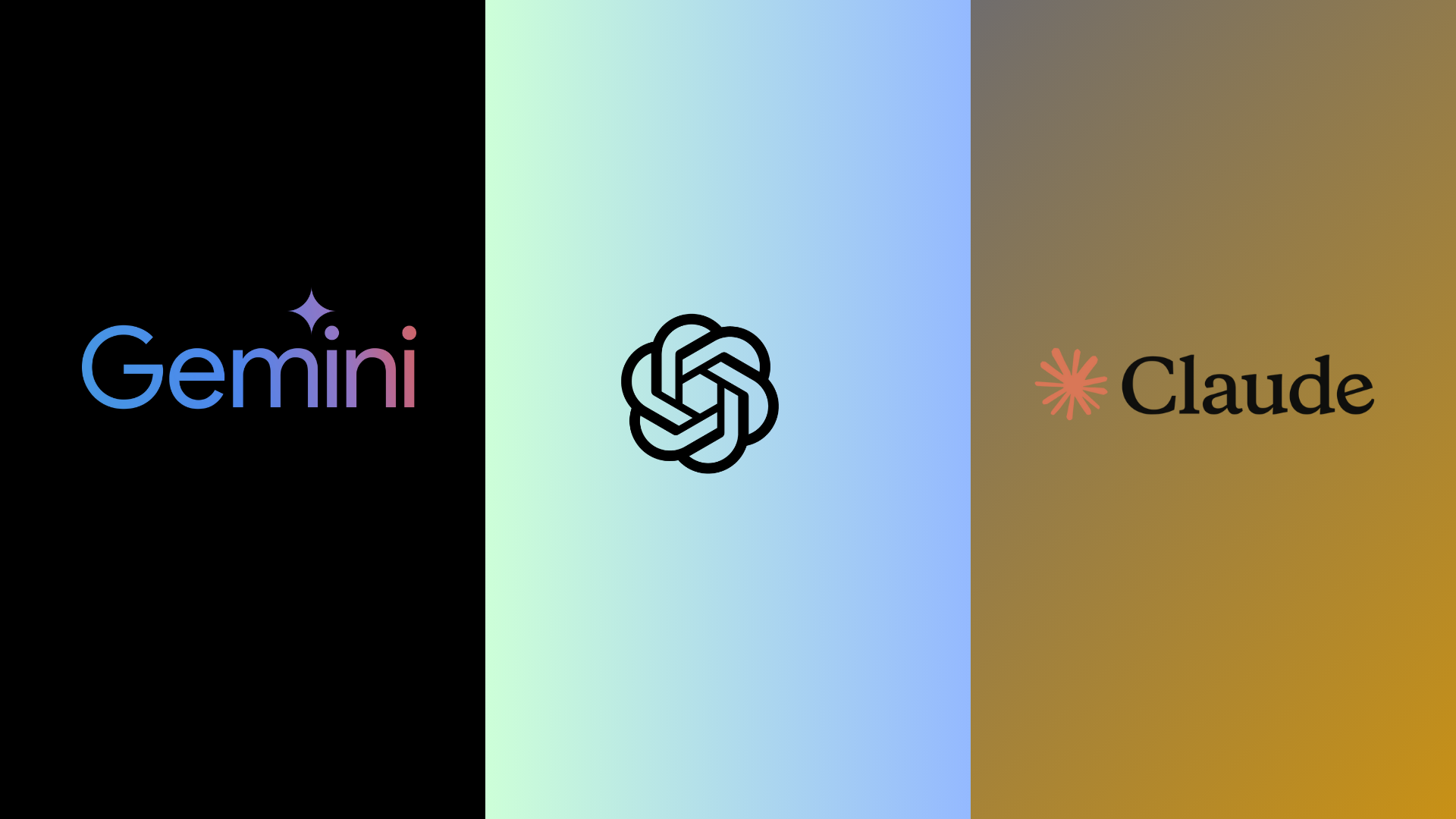

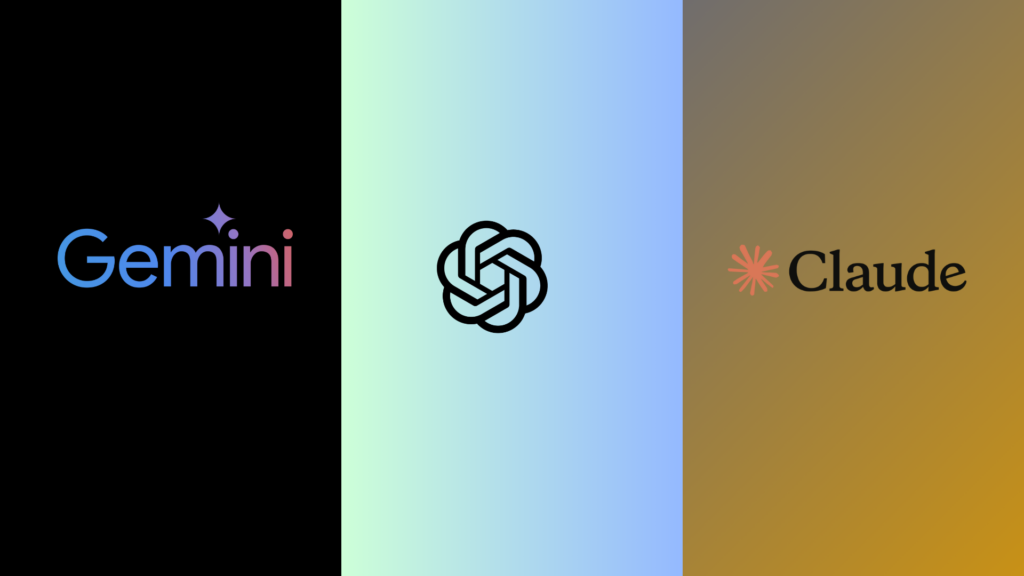

AI chatbots and Large Language Models (LLMs) are rapidly evolving, especially since the sudden widespread popularity of ChatGPT starting in 2022.
Fast forward to 2024, and every major tech company is now either developing or integrating chatbot technology into their products and services. ChatGPT, Gemini, and Claude are three of the most well-known chatbots around the world.
In this article, “ChatGPT vs Gemini vs Claude,” we are going to explore the pros and cons of each of them and compare their features, pricing, and use cases for you so that you can easily choose the right chatbot that suits your needs.
Let’s dive in!
Learning each model’s core architecture and features is important to understand their strengths and weaknesses. Let’s start by tearing each of the models apart.
OpenAI developed and launched ChatGPT on November 30, 2022. With over 200 million weekly active users worldwide, It is one of the world’s most widely used AI language models.
Based on GPT-3, but now redesigned for GPT-4 and more, It aims at delivering human-like feedback and has proven itself well-suited to a wide range of text-based tasks, including creating concise and detailed content, answering questions, and helping with daily problem-solving.
It was initially free when it was first launched. However, the free version had a few limitations, such as usage caps and potential slowdowns during peak traffic times. So, they launched the paid version ChatGPT Plus, which offered priority access to the model, even during peak times.
Its biggest improvement in recent releases (March 2023), such as GPT-4, is its multimodality, whereby the model can handle text and images.
Capterra rating: 4.5
Gemini (previously known as Bard) is one of Google DeepMind’s recent AI models, the latest product to emerge from Google’s labs. A direct competitor to OpenAI’s ChatGPT, Gemini specializes in delivering cutting-edge NLP solutions. It focuses on enhancing the quality of Google search results and information retrieval.
The model is better suited for creating reliable, accurate output, making it suitable for commercial and teaching purposes.
Like competitors, Gemini is extremely effective at inventive tasks such as creating content and summarizing. Still, it goes further and works very closely with Google’s ecosystem, harnessing the power of cloud computing for faster, more scalable execution.
Capterra rating: 5
Another AI language model developed by Anthropic is Claude. With its conversational AI capabilities, Claude is safety-focused in that its results are moral and user-driven. Claude is most well known for offering models with different capabilities, like Claude 3.5, a streamlined version that enhances previous versions.
Its focus on safety and responsible usage has earned it a place in industries that value conversational integrity. Despite its moral focus, Claude also performs great NLP in various text-based applications, from code analysis to writing.
As AI technology evolves rapidly, especially with the rise of LLMs and AI chatbots, Privacy concerns are a huge issue. Claude, however, tends to focus deeply on ethical AI practices.
Capterra rating: 4.7
Pros: (about Gemini and Claude)
Cons:
pros
Cons
Read more: “Microsoft copilot vs Gemini”
Pros:
Now, let’s examine these models based on key factors such as function, performance, cost and accessibility to understand their relative strengths and weaknesses.
ChatGPT is excellent at understanding prompts but may occasionally misinterpret overly vague prompts or struggle with highly specific subject matter, especially in the free version.
Gemini shines in understanding fact-based queries. It’s less flexible in creative tasks. However, it delivers highly precise responses for complex, fact-based queries due to having live access to the web.
Claude is cautious in interpreting prompts, especially those with moral, ethical, or controversial implications.
ChatGPT is more prone to “hallucinations,” meaning it’ll sometimes give you inaccurate answers with such confidence. It tends to generate useful content for general queries; however, it may provide less accurate answers for highly technical or specialized areas.
Gemini often outperforms ChatGPT when it comes to factual accuracy. It’s more precise but can sometimes be less conversational or intuitive than ChatGPT.
Claude is extremely reliable when it comes to ethical correctness and providing safe content, but it can be less detailed in terms of complex factual accuracy compared to Gemini. It sometimes sacrifices depth just to be on the safe side.
ChatGPT is better at handling context over long periods of conversations. GPT-4 (used in ChatGPT Plus) supports a context window of 8,000 tokens (standard) and 32,000 tokens (extended). This allows it to handle longer, more complex conversations and remember more details when it comes to fluidity in dynamic conversation, ChatGPT wins.
Gemini Typically handles contextual shifts in structured settings well and can handle up to 1 million tokens. However, it is less fluid in back-and-forth exchanges compared to ChatGPT, as it prioritizes accuracy and precision over conversational flow.
Claude: Context is handled with care, especially when dealing with sensitive or ethical topics. It can handle up to 200k tokens, making it great at deeper analysis. It tracks context well within specific discussions but often errs on the side of caution, especially when the intent is unclear, making it less fluid in dynamic conversations.
ChatGPT is known for its fast response times, especially in its free version. Its ability to handle general queries quickly makes it ideal for casual users. However, responses can slow down with complex queries or in longer threads.
Gemini seems to get slower as the number of tokens gets higher.
Claude: Slower than both ChatGPT and Gemini, primarily due to its additional ethical safeguards and response filters.
ChatGPT offers multimodal capabilities in the paid version. Its integration with DALL·E made it capable of advanced image generation. This makes it highly versatile for tasks that involve both written and visual data, like generating captions or describing visual content.
Gemini is known for high Multimodal functionality. While ChatGPT focuses on text and image generation, Gemini focuses on text, voice, and visual data processing.
Claude: Text-only for now. Like Gemini, Claude doesn’t support multimodal inputs (such as images) and is strictly focused on natural language processing.
ChatGPT supports various APIs, including access to GPT-4, GPT-3.5, DALLE (for image creation and editing), and Whisper (for speech-to-text).
Gemini benefits from seamless integration with Google Cloud’s suite of developer tools and APIs, including Vertex AI, which allows developers to train custom models.
Claude’s integration capabilities are more limited than those of ChatGPT and Gemini. It doesn’t offer the same level of integration with external tools, making it less versatile for users looking to extend its functionality.
ChatGPT has some concerns about data handling and over-optimization for SEO. There are occasional concerns about how it handles personal or sensitive information.
Gemini is a part of Google’s broader ecosystem, so there could be concerns about data privacy, especially regarding personal data shared across Google’s platforms.
Claude has top-tier security and ethical safeguards. Claude emphasizes safe, responsible AI and is particularly suited for regulated industries like healthcare or law.
ChatGPT is designed to be highly user-friendly. It has an intuitive interface for both beginners and experienced developers. It’s basically very easy to use.
Gemini benefits from deep integration with Google Cloud, which provides enhanced scalability and ease of use for people already working within the workspace.
Claude’s interface is more suitable for users with technical knowledge.
ChatGPT is ideal for content generation—such as writing articles, blog posts, or social media copy—for customer support. It can act as a chatbot that provides real-time assistance. It’s also great for brainstorming ideas, education, and coding help. Developers use it to debug code or explain programming concepts in an easier way.
For example, Here’s some screenshots of when I asked both ChatGPT and Gemini (free version) “how do chatbots work,” ChatGPT seems better for users looking for brainstorming and content generation, while Gemini is more focused on delivering quick, accurate answers.
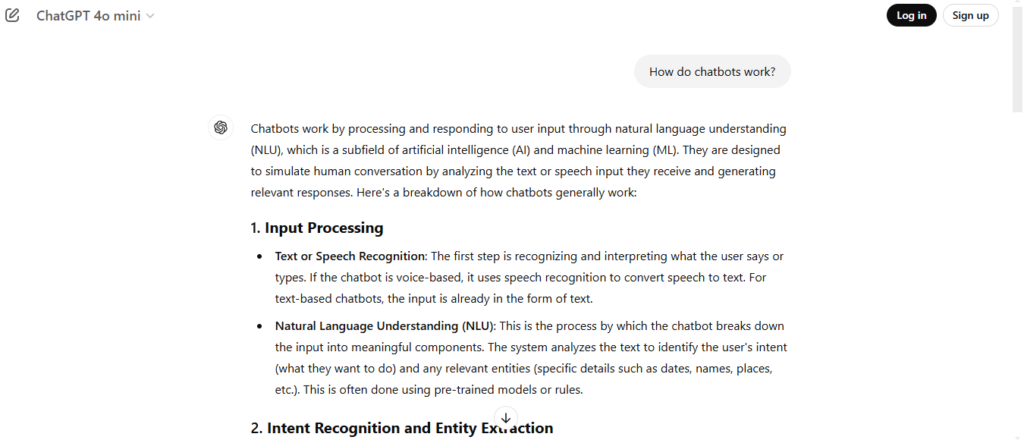

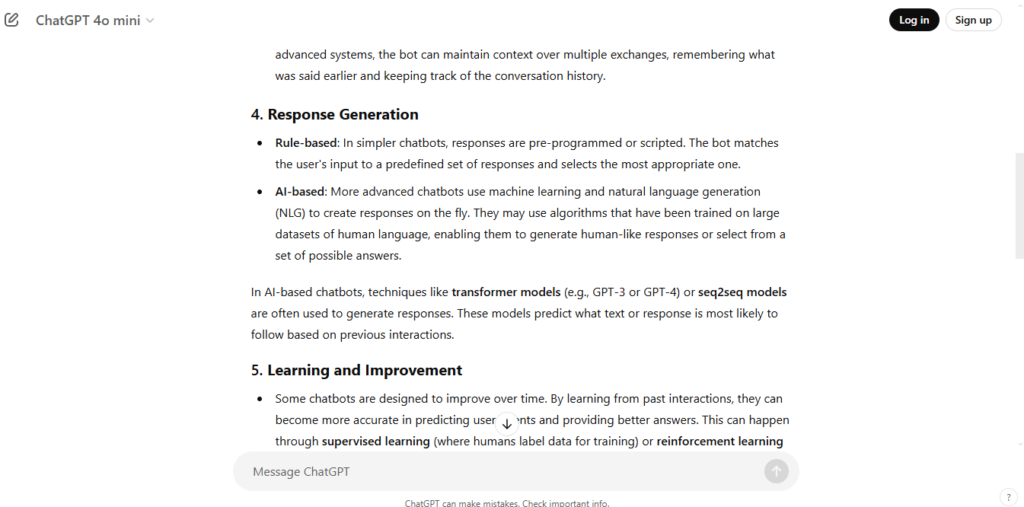

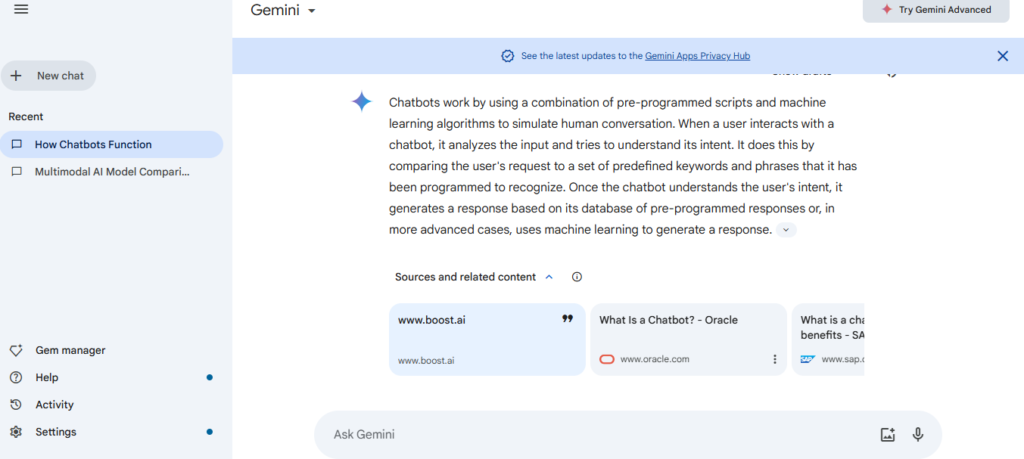

Gemini, on the other hand, is better at handling enterprise-level, data-driven applications. For developers who work with Google Cloud, Gemini can be utilized to build scalable applications using Google’s rich cloud services.
Claude’s focus is on ethically sound and safe AI. Its power is derived from high-priority sectors such as health, law, and financial sectors that require a high degree of security and compliance. Claude can help with confidential tasks such as reviewing medical records, contracts and legal paperwork while adhering to professional standards.
| Feature | ChatGPT (OpenAI) | Gemini (Google DeepMind) | Claude (Anthropic) |
|---|---|---|---|
| Capterra Rating | 4.5 | 5 | 4.7 |
| Versions | GPT-3.5, GPT-4, GPT-4o | Gemini 1.0, 1.0 Pro, 1.5 Flash, Haiku, Sonnet, Opus | Claude (Haiku, Sonnet, Opus) |
| Strengths | Versatile, conversational, multimodal (text + images) | High accuracy, real-time data, Google ecosystem | Ethical, empathetic, safety-focused |
| Weaknesses | Prone to hallucinations, less technical accuracy | Less creative, slower with large data | Slower, less creative, text-only |
| Use Cases | Content creation, customer support, coding | Technical queries, enterprise-level applications | Healthcare, law, compliance tasks |
| Multimodal Support | Yes (Text + Images) | High multimodal capabilities (text, voice, visuals) | No (Text-only) |
| Accuracy | Moderate (hallucinations) | High for factual/technical queries | Reliable, but sacrifices depth for safety |
| Context Window | Up to 32,000 tokens (GPT-4) | Handles up to 1 million tokens | Up to 200k tokens |
| Integrations | Wide range (Slack, GitHub, Microsoft 365) | Google Cloud, Vertex AI | Limited |
| Pricing | Free, $20/month (Plus), $25/month (Team) | Free, pay-as-you-go (varies) | Pay-as-you-go (based on tokens) |
| Ideal For | Versatile tasks (content, customer support, coding) | Data-driven, technical applications | Ethical AI in regulated industries |
Free Plan:
ChatGPT Plus (Paid Plan):
Team plan:
Claude AI Pricing (Anthropic) Pay-as-you-go API costs, based on token volume.
Best for: Conversational AI, fiction writing, content generation, code-related queries, and problem-solving.
Strength: Excellent fluency in conversation and a great amount of flexibility. It is also very good at working with tasks that require in-depth analysis, including content creation, brainstorming, and customer support. It’s a high-quality, dialogue-enabled model, which makes it the perfect solution for any company that wants to use chatbots or virtual assistants.
Limitations: While it works pretty well in general NLP applications, it doesn’t necessarily offer as much depth or accuracy as special models.
Integration capabilities: If you work with a variety of domains—such as content creation, customer support, education, or software development—ChatGPT excels due to its versatile API and seamless integration with a wide range of platforms, including Slack, Zapier, GitHub (via Copilot), and many more. However, if you or your team is heavily invested in Google products, Gemini is a better choice.
Best for: Innovative research apps, advanced analysis and multi-language tasks.
Strength: Gemini models are based on deep research and have multimodal processing, so they can handle text and images. If your work involves combining various kinds of data sources (such as visuals and textual content), you could try out Gemini. And it’s fast and highly accurate, at least when it comes to technical or specialty queries.
Limitations: Gemini can be more costly to deploy and, therefore, less suited for inexpensive or small-scale applications. Nor is it necessarily more specialized.
Integration capabilities: Due to its deep integration with Google products, it’s ideal for teams or users already embedded into Google Workspace.
Best for Safety-related AI and compliance-related tasks.
Strength: Claude emphasizes user safety, ethics, and openness. If your app involves careful AI behaviour monitoring and ethical compliance (i.e., healthcare, legal, education), Claude will reduce toxic outputs and deliver better outcomes in high-risk scenarios.
Limitations: Claude can be less agile and sophisticated in most conversations than ChatGPT or Gemini, especially in more imaginative or dynamic applications.
Each tool has its strengths depending on the needs—ChatGPT for flexibility and multimodal tasks, Gemini for technical precision, and Claude for sensitive, ethical contexts.
If you want in-depth, creative content or brainstorming, ChatGPT is better for you. If you need quick, and factual information, Gemini excels. For balance between clarity and reasoning, Claude offers a strong middle ground. For coding, ChatGPT is ideal for detailed solutions, while Claude is great for clear, efficient code.
Gemini may outperform ChatGPT in accuracy, real-time data access, and handling technical queries, especially for users embedded in Google’s ecosystem. However, ChatGPT is more versatile and excels at creative tasks and conversation flow.
Gemini excels in real-time data access, especially within the Google ecosystem. It can also retrieve images from the web, which ChatGPT can’t.
ChatGPT is typically better at coding tasks; it offers easier concept explanation debugging and provides practical coding help. Gemini, while accurate, focuses more on technical queries and may lack ChatGPT’s interactive coding support.
Gemini 1.5 Pro may excel in technical precision and enterprise-level applications with Google Cloud integration. However, ChatGPT 4 is better at multimodal tasks, creativity, and versatility, making it the preferred choice for broader use cases.